
Resources Environment and Sustainability
Scope & Guideline
Driving Impactful Change Through Rigorous Research
Introduction
Aims and Scopes
- Sustainable Resource Management:
Research that explores the efficient and sustainable management of natural resources, including water, soil, and minerals, to balance ecological integrity with human needs. - Environmental Impact Assessment:
Studies that evaluate the potential environmental impacts of various projects and policies, emphasizing the importance of integrating environmental considerations into decision-making. - Climate Change Adaptation and Mitigation:
Research focusing on strategies to adapt to climate change effects and mitigate its impacts, including carbon management, renewable energy adoption, and resilient agricultural practices. - Circular Economy and Waste Management:
Investigations into circular economy principles, including waste reduction, recycling, and resource recovery, to promote sustainable consumption and production patterns. - Ecosystem Services and Biodiversity:
Research examining the relationship between ecosystem services and biodiversity, highlighting their importance for human well-being and sustainable development. - Technological Innovations for Sustainability:
Studies on the role of technological advancements in promoting sustainability, including smart technologies, green finance, and innovative agricultural practices.
Trending and Emerging
- Impact of Climate Change on Food Systems:
An increasing number of studies are exploring how climate change affects agricultural productivity, food security, and the sustainability of food systems, highlighting the urgency of this issue. - Integration of Technology in Sustainability Practices:
Research is trending towards the application of advanced technologies, such as machine learning and remote sensing, in enhancing sustainability in various sectors, including agriculture and urban planning. - Microplastics and Environmental Pollution:
There is a growing focus on the impact of microplastics on ecosystems and human health, indicating an emerging concern for pollution and its long-term consequences. - Green Finance and Sustainable Development:
The intersection of finance and sustainability is increasingly addressed, with studies exploring how green finance can drive sustainable development and resource management. - Urban Sustainability and Green Infrastructure:
Emerging themes include the role of urban green spaces and sustainable infrastructure in enhancing urban resilience and environmental quality, reflecting a shift towards urban ecological research.
Declining or Waning
- Traditional Agricultural Practices:
Research focused on conventional agricultural methods seems to be declining, with fewer studies exploring non-sustainable practices in favor of innovative and sustainable approaches. - Single-Disciplinary Approaches:
There is a noticeable decrease in papers adopting purely disciplinary perspectives, as the journal increasingly emphasizes interdisciplinary approaches that integrate multiple fields of study. - Localized Environmental Issues:
While localized studies were once prevalent, there has been a shift towards more global or comparative analyses, indicating a waning interest in isolated environmental issues. - Resource Extraction and Exploitation:
Research directly addressing the exploitation of natural resources without consideration of sustainability is less frequent, reflecting a shift towards sustainable practices and policies.
Similar Journals
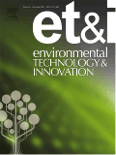
Environmental Technology & Innovation
Transforming Environmental Challenges into Technological TriumphsEnvironmental Technology & Innovation is a leading academic journal published by Elsevier, focusing on groundbreaking research and advancements in the fields of Environmental Science, Plant Science, and Soil Science. Since its inception in 2014, this prestigious journal has established itself in the top Q1 quartiles of its categories, reflecting its commitment to publishing high-quality, impactful research. As evidenced by its impressive Scopus ranks, including a rank of #14/516 for Plant Science and #5/159 for Soil Science, it serves as a vital resource for scholars, researchers, and professionals aiming to advance their understanding and innovation in environmental technologies. Although it operates under a subscription model, the journal provides significant insights and access options, making it an essential addition to any researcher's library. With its emphasis on sustainability and technological advancements, Environmental Technology & Innovation remains at the forefront of addressing global environmental challenges and fostering innovative solutions.
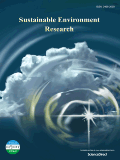
Sustainable Environment Research
Empowering global change with cutting-edge environmental science.Sustainable Environment Research, an esteemed journal published by BMC, serves as a pivotal platform for disseminating innovative research in the fields of Environmental Engineering, Pollution, and Renewable Energy. Established in 2016 as an Open Access journal, it facilitates the widespread sharing of knowledge and advancements across the globe, reflecting its commitment to enhancing environmental sustainability. With an impressive Q1 ranking in multiple categories, including Water Science and Technology and Pollution, the journal is recognized for its significant impact, currently holding a rank of 31st in Environmental Science - Water Science and Technology. The journal actively invites researchers, professionals, and students to contribute to crucial discussions around sustainable practices and technologies, thus addressing worldwide environmental challenges. Based in Taiwan but accessible internationally, Sustainable Environment Research provides a valuable resource for those dedicated to advancing the science of sustainability.
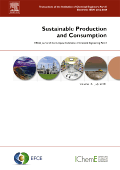
Sustainable Production and Consumption
Empowering Change for a Sustainable FutureWelcome to Sustainable Production and Consumption, a premier journal published by Elsevier in the vibrant field of sustainability and environmental science. With an ISSN of 2352-5509, this journal has established itself as a leading platform for innovative research and discourse on sustainable manufacturing, consumption practices, and environmental technologies. As evidenced by its impressive 2023 rankings—Q1 in Environmental Chemistry, Environmental Engineering, Industrial and Manufacturing Engineering, and Renewable Energy, Sustainability and the Environment—the journal ranks among the top tier of its field. Researchers and professionals alike are invited to explore the journal’s rigorous peer-reviewed articles, which aim to advance the understanding and implementation of sustainable practices across various industries. With a strong commitment to disseminating impactful research, Sustainable Production and Consumption serves as an essential resource for academics, policy makers, and industry leaders seeking to address the challenges of modern environmental sustainability.

ENVIRONMENTAL REVIEWS
Elevating Critical Reviews for a Greener TomorrowENVIRONMENTAL REVIEWS, published by Canadian Science Publishing, is a leading academic journal dedicated to the field of Environmental Science. With an impressive 2023 Q1 ranking in Environmental Science (miscellaneous) and a Scopus rank of #30 out of 233, it reflects the journal's substantial influence and contribution to the discourse on environmental issues. Launched in 1993, this journal provides a platform for critical reviews and innovative research in areas ranging from ecological sustainability to environmental policy, ensuring that it remains at the forefront of scientific inquiry. Although it currently does not offer open access, ENVIRONMENTAL REVIEWS continues to cater to a diverse readership of researchers, professionals, and students, fostering knowledge exchange essential for tackling contemporary environmental challenges. This journal not only strives to disseminate crucial findings but also aims to inspire informed decision-making and practical solutions to promote ecological welfare.

Frontiers of Environmental Science & Engineering
Exploring the nexus of science and engineering for a greener planet.Frontiers of Environmental Science & Engineering is a premier journal published by HIGHER EDUCATION PRESS that stands at the forefront of interdisciplinary research in environmental science and engineering. Established in 2013 and converging its scope through 2024, this journal has swiftly ascended to a notable Q1 category in the Environmental Science (Miscellaneous) segment, highlighting its remarkable impact and relevance. With a Scopus ranking of 27 out of 233 in its field, placing it within the top 88th percentile, it serves as a crucial platform for disseminating cutting-edge research, innovative methodologies, and pressing environmental concerns. Researchers, professionals, and students alike will find valuable insights and opportunities for collaboration within its pages. While the journal operates under a subscription model, its commitment to advancing the field makes it an essential resource for those dedicated to addressing the world's environmental challenges, fostering sustainable practices, and pioneering engineering solutions.

One Earth
Exploring groundbreaking research for a sustainable future.One Earth is a premier academic journal published by Cell Press, dedicated to advancing research in the fields of Earth and Planetary Sciences as well as Environmental Science. With an impactful presence in the academic community and an impressive ranking, One Earth has achieved Q1 status in both Earth and Planetary Sciences and Environmental Science, showing its commitment to the highest standards of scholarly excellence. Founded in 2019, this journal has quickly established itself as a leading platform for groundbreaking research, contributing to the global conversation on sustainability and environmental stewardship. With a distinguished Scopus rank placing it in the 99th percentile among Earth and Planetary Sciences and the 97th percentile in General Environmental Science categories, One Earth aims to disseminate cutting-edge findings and foster innovative approaches to address pressing global challenges. The journal is indexed with an ISSN of 2590-3330 and an E-ISSN of 2590-3322, supporting a broad audience of researchers, professionals, and students passionate about ecological integrity and planetary health.
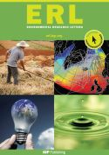
Environmental Research Letters
Driving discourse on global ecological challenges.Environmental Research Letters is a premier, peer-reviewed journal published by IOP Publishing Ltd based in the United Kingdom, dedicated to advancing the field of environmental science. With an impressive Impact Factor and consistently ranked in the Q1 category for its focus on Environmental Science, Public Health, and Renewable Energy, this open-access journal has been a vital resource for researchers and practitioners since its inception in 2006. Covering a wide scope of topics including sustainability, environmental health, and innovative energy solutions, ERL aims to promote discourse and disseminate groundbreaking research that addresses global environmental challenges. As a leader in the field, it holds prestigious positions in Scopus rankings, ensuring that published works reach a wide audience, thus driving impactful change. Researchers, professionals, and students alike will find valuable insights and essential knowledge within its pages, making it a keystone publication for anyone invested in environmental advancements.

Environmental Sciences Europe
Transforming environmental knowledge into action.Environmental Sciences Europe is a leading peer-reviewed journal published by SPRINGER, dedicated to advancing research in the field of environmental science, with a specific focus on pollution and its mitigation. Since its transition to Open Access in 2011, the journal has been committed to disseminating high-quality research without barriers, thereby ensuring that critical knowledge is freely accessible to researchers, practitioners, and policymakers around the globe. Based in Germany and with a commendable Q1 ranking in Pollution for 2023, the journal stands out in the Scopus rankings, occupying the 23rd position out of 167 in its category, reflecting its significant impact in shaping environmental discourse. With a convergence of global research efforts projected until 2024, Environmental Sciences Europe aims to provide a vital platform for scholarly communication and collaboration, ultimately contributing to sustainable solutions for pressing environmental challenges.
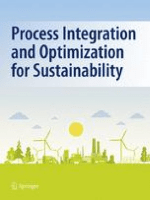
Process Integration and Optimization for Sustainability
Fostering Innovation in Process OptimizationProcess Integration and Optimization for Sustainability is an esteemed journal, published by SPRINGERNATURE, dedicated to advancing knowledge in the realms of chemical engineering, environmental science, and sustainable development. Established in 2017, this journal provides a platform for rigorous research that addresses the critical challenges of integrating and optimizing processes to achieve sustainability goals. With a commendable Q2 category ranking across various disciplines such as Chemical Engineering, Control and Systems Engineering, and Geography, along with impressive Scopus rankings, it has quickly established itself as a vital resource for researchers, professionals, and students. The journal's focus on innovative solutions for pollution control, renewable energy, and effective waste management aligns with global sustainability objectives. For academics seeking to publish their findings or stay abreast of the latest advances in these areas, Process Integration and Optimization for Sustainability is an indispensable resource that promises to foster impactful discussions and disseminate vital knowledge within the academic community.

Present Environment and Sustainable Development
Advancing sustainability through innovative research.Present Environment and Sustainable Development, published by ALEXANDRU IOAN CUZA UNIVERSITY PRESS, is a prominent open-access journal dedicated to advancing knowledge in the field of environmental science and sustainable development. Since its inception in 2014, the journal has provided a platform for researchers, professionals, and students to disseminate transformative ideas and innovative research aimed at addressing crucial environmental challenges. With its ISSN 1843-5971 and E-ISSN 2284-7820, it emphasizes the necessity of sustainable practices in contemporary society, facilitating interdisciplinary approaches that unite various fields, including ecology, policy, and socio-economic studies. Based in Iasi, Romania, this journal plays a vital role in fostering international collaboration and dialogue on sustainability, making it an essential resource for anyone committed to understanding and improving the environment for future generations.